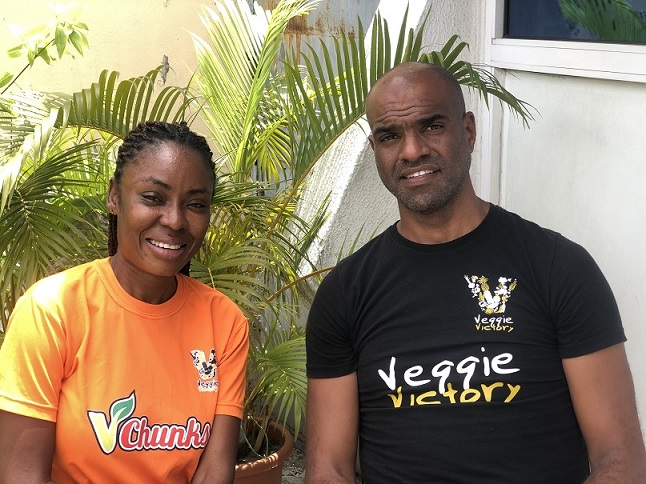VeggieVictory is Nigeria’s first plant-based food tech company, pioneering plant-based meats and meals since 2013.
VeggieVictory is a pioneering plant-based food company. Can you tell us what drove you to produce Vchunks, a meat alternative for the Nigerian market?
My co-founder Bola Adeyanju and I are both mission-driven, having chosen a vegan lifestyle together for over 30 years. We always noticed the lack of plant-based options – products as well as restaurants. So we actually started VeggieVictory as a restaurant in May 2013 – the first vegan restaurant in Nigeria. We did not know what to expect and just wanted to give it a shot. We simply thought there should be other people out there who also like veganized Nigerian food – like suya (BBQ) or our typical stews and all kinds of meat recipes. As people from all walks of life were coming in, we felt the limitations of vegan products even more. From there it was not far to start venturing into our meat alternative product 'Vchunks,' which is now available in stores nationwide and beyond. Also, a number of restaurants have started using Vchunks to up their game in offering Vegan meals.

Who are your typical customers? Do you reach different economic segments?
Our customers include all economic groups, from low income to affluent. The fitness, wellness and weight loss trend (Fitfam) has also reached Nigeria. These people know that diet is crucial in living a healthy lifestyle. We find a lot of Vchunks customers there. Also, generally people above 40 are opting for ways to reduce animal protein intake. They like Vchunks as well. The elderly appreciate Vchunks as it can be prepared to be chewed easily. Last but not least, there are millions of Nigerians suffering from non-communicable diseases like hypertension, diabetes, obesity but also protein deficiency. Vchunks helps them to eat more plant-based foods, which has proven to help with controlling these lifestyle diseases.
How do you ensure that your food products are high quality and affordable for underserved communities as well?
Our raw materials have the highest quality. Furthermore our products are all NAFDAC certified (National Agency for Food and Drug Administration and Control /Nigeria's regulatory body) and we also have a facility registration from FDA for exporting to the United States. From the start, in developing Vchunks, it was key for us to at least match the price of beef so that low-purchasing power parts of society can also afford our meat substitute. We have achieved that – while most plant-based meat alternatives internationally are still significantly more expensive than meat. Not only that, but in terms of volume, Vchunks actually even gives you twice more volume than beef.
What level of impact have you had on health and sustainability in Nigeria? How do you measure this impact?
Vchunks is a high protein product. Products like these are important to address the severe protein deficiency we face in this country and in fact on the entire continent. Africa is the continent with the by far highest protein deficiency. And in Nigeria 40 per cent of the children do not get enough protein. So we know every pack of Vchunks delivered will help reduce protein deficiency as well as reduce our literally 'all eggs in one basket' dependency on animal protein.
Do you plan to expand? What do you need in order to reach your goals for the next few years?
Of course, Nigeria is our home and core market and it is the largest one in Africa. However, we already have relationships with a number of other African countries like Kenya, Ghana, South Africa etc. Interestingly, the African diaspora in the US and Europe is also interested in our products as they are looking for plant-based products that work for the African cuisine and are made in Africa.
VeggieVictory was recently selected by the AgFunder GROW accelerator in Singapore. It’s an incredible program with an inspiring vision for Agtech in the world. We are glad to have received funding from international investors who see Africa's potential in the plant-based protein market. This helps us with increasing production capacity, further product development, marketing and distribution.